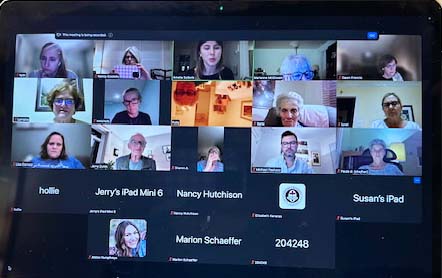On Monday evening, October 27th, in the seventh of a continuing series of Cabrini University CAVS Social Justice Ambassadors webinars, the topic was Domestic Violence, which was presented by Colleen Lelli, Ed.D., former Professor of Education at Cabrini University, and a national expert on domestic violence and child trauma. Here are some highlights from her presentation:
What can we do to assist families suffering from domestic violence?
One in three women and one in four men in the U.S. have faced intimate partner violence in their lifetime. When someone escapes from domestic violence, they often turn to government assistance in the form of Medicaid and SNAP food benefits. Over the summer, these two forms of assistance received drastic cuts, and now, beginning Nov. 1, all SNAP food benefits will be suspended.
These were some of the less-known effects of the U.S. government’s current budget cuts affecting vulnerable Americans.
Colleen gave an overview of the extent of domestic violence, its manifestations, and the complex dynamics of power and control. By discussing scenarios, participants explored how to know the signs [of domestic violence], the importance of listening [to the accounts of others], the need to ensure the victim’s safety, and the importance of supplying good information.
Dr. Lelli provided participants with a copy of her presentation and helpful resources. Readers may access them here. http://bit.ly/4quJcBP
Following her presentation, participants wrote emails to President Trump and Congress to free up emergency money so survivors of domestic violence will not lose SNAP benefits on November 1st. In addition, participants advocated to restore Medicaid benefits. Here is a link to advocate: http://bit.ly/49bZWYr
You may view a video of Dr. Lelli’s presentation here. http://bit.ly/4nNY4J3
Key Takeaways: Supporting a Loved One in a
Domestic Violence Relationship
Recognize Red Flags of Power & Control
• Isolation from friends and family
• Monitoring phone, social media, whereabouts
• Verbal abuse, intimidation, or humiliation
• Control of money, work, or resources
• Explosive outbursts followed by apologies (“cycle of violence”)
What You Can Do
• Listen without judgment: Believe them and let them share at their own pace.
• Express care: “I’m worried because I care about you.”
• Validate feelings: Abuse is never their fault.
• Offer information, not ultimatums: Share hotline numbers, shelters, or counseling resources.
• Stay connected: Keep the lines of communication open so they know you’re a safe person.
• Respect autonomy: Remember, only they can decide when and how to leave.
What Not To Do
• Don’t confront the abusive partner — it can escalate danger.
• Don’t pressure them to “just leave” — leaving is the most dangerous time.
• Don’t shame, criticize, or make them feel guilty for staying.
• Don’t withdraw support if they return to the relationship.
Ways to Offer Support
• Provide emotional support and a safe space to talk.
• Help brainstorm a safety plan (e.g., safe contacts, documents, emergency exits).
• Offer practical help: childcare, transportation, a safe place to stay — but only if it feels safe.
• Encourage professional help: domestic violence hotlines, shelters, legal services.
Resources
• National Domestic Violence Hotline (U.S.): 1-800-799-7233 (SAFE) or text START to 88788
• If in immediate danger: Call 911
Remember: You can’t “rescue” someone — but you can be a steady, supportive presence.
Consistent care can help them feel less isolated and more empowered to make safe choices.
October is Domestic Violence Awareness Month ~ Follow these organizations on social media
• Laurel House
• Victim Services of Montgomery County, Inc.
• Women’s Center of Montgomery County
• Domestic Violence Center of Chester County
• The National Network to End Domestic Violence
• National Domestic Violence Hotline
• Pennsylvania Coalition Against Domestic Violence
• It’s On Us

 The Cabrini Social Justice Ambassadors of the Cabrini University CAVS (Cabrini Alumni, Volunteers and Supporters) under the direction of Dr. Jerry Zurek, former Chair of the Communications Department, hosted a Zoom with Cabrini Immigrant Services (CIS) leaders Lorraine Campanelli, Director of Cabrini Immigrant Services, Dobbs Ferry, NY and Amelia Scdoris, Justice for Immigrants Coordinator, at Cabrini Immigrant Services-NYC.
The Cabrini Social Justice Ambassadors of the Cabrini University CAVS (Cabrini Alumni, Volunteers and Supporters) under the direction of Dr. Jerry Zurek, former Chair of the Communications Department, hosted a Zoom with Cabrini Immigrant Services (CIS) leaders Lorraine Campanelli, Director of Cabrini Immigrant Services, Dobbs Ferry, NY and Amelia Scdoris, Justice for Immigrants Coordinator, at Cabrini Immigrant Services-NYC.